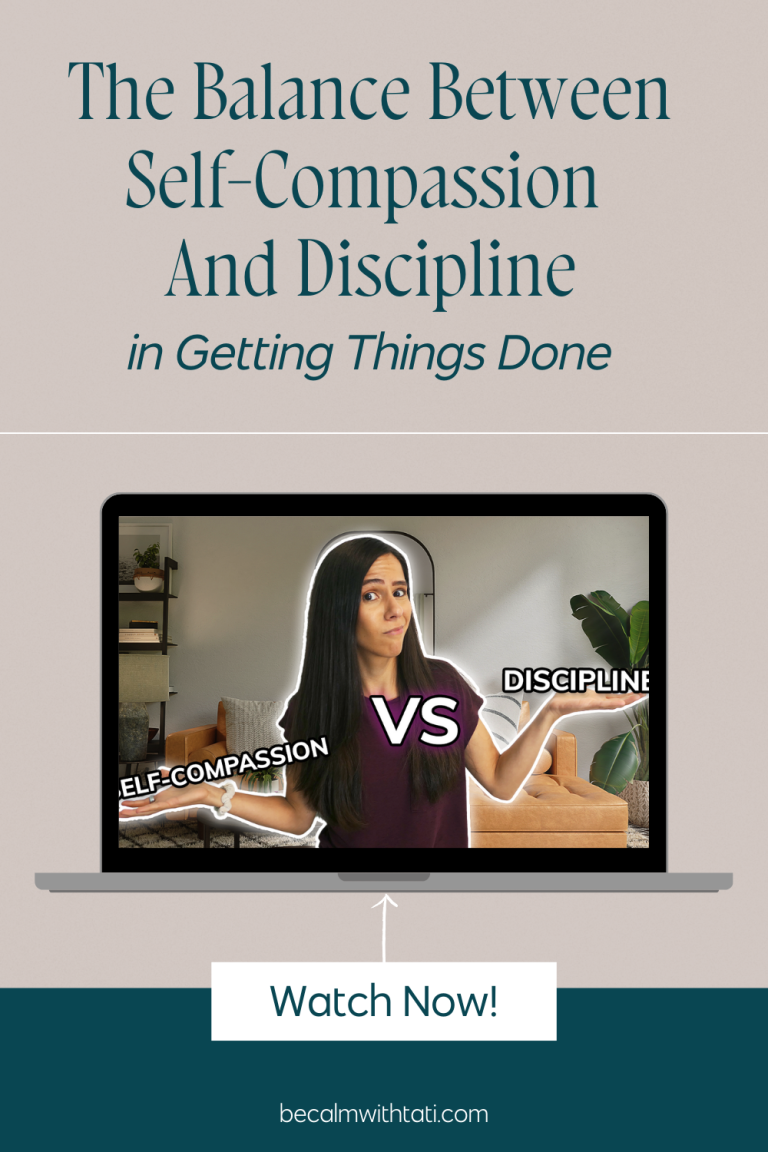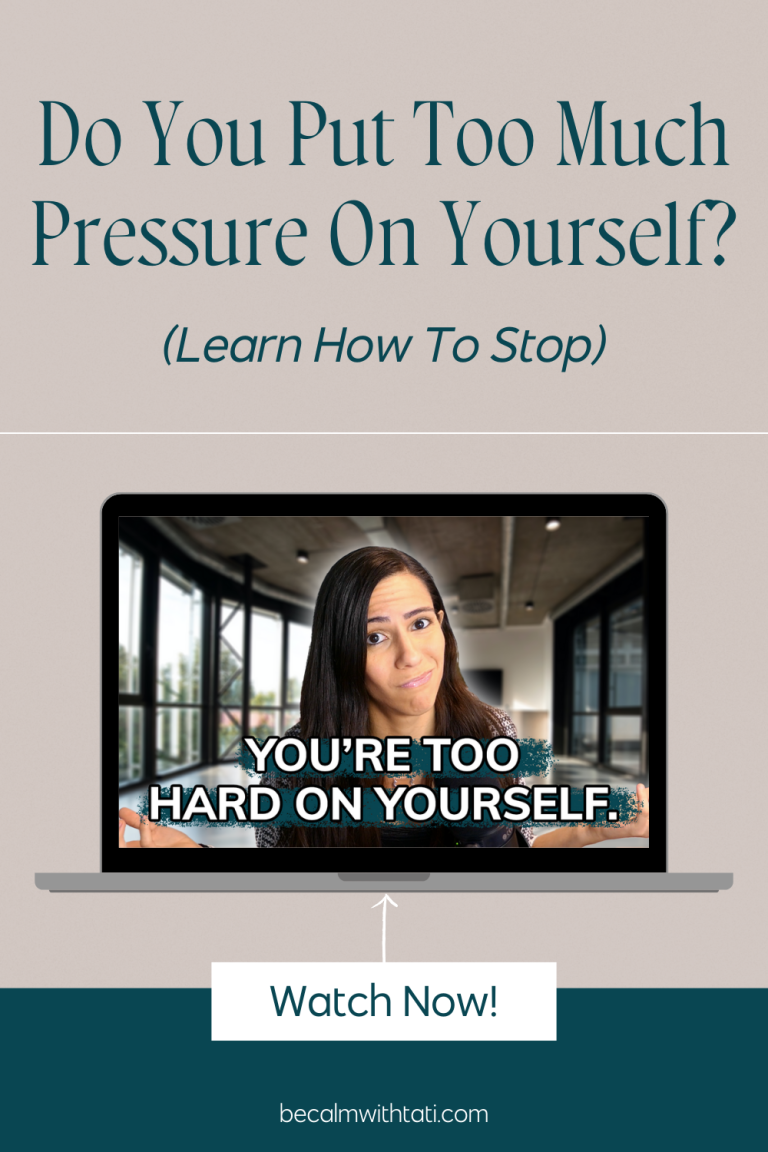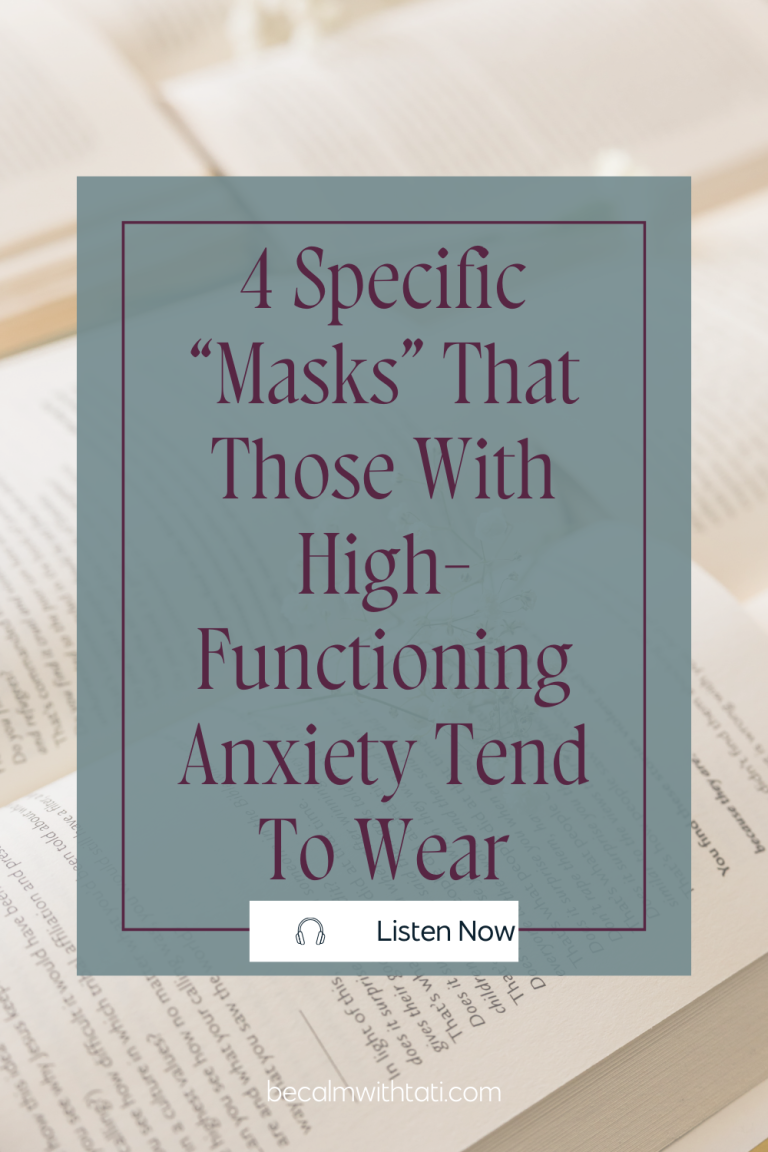Everybody puts pressure on themselves at one time or another. Pressure to be a better person, be healthier, do more work, be a better wife, husband, parent, the list goes on. But how much of this pressure is healthy, and how much of it just results in more stress, tension, and anxiety?
In this episode, you will learn:
- How to know when you’re putting too much pressure on yourself
- Why you think putting pressure on yourself is helping you, but it’s actually making things harder for you
- The types of pressure you experience and how they influence you
- Concrete action steps to help you stop putting so much pressure on yourself
*This is a replay of an episode originally aired in 2020.
LISTEN NOW:
🎧 CLICK HERE TO LISTEN TO CALMLY COPING WHEREVER YOU LISTEN TO PODCASTS
WATCH NOW:
DOWNLOAD THE FREE GUIDE: GOODBYE OVERWHELM: YOUR GUIDE TO ACCOMPLISH MORE BY DOING LESS:
http://calmlycoping.com/overwhelm
FREE TRAINING: How to Create Work-Life Balance and Feel Calmer From Within
If you want to learn how to take back control of your life so you can feel calmer and more confident, and learn the tools to spend your time according to what matters most to you (no matter what your schedule is like right now)…
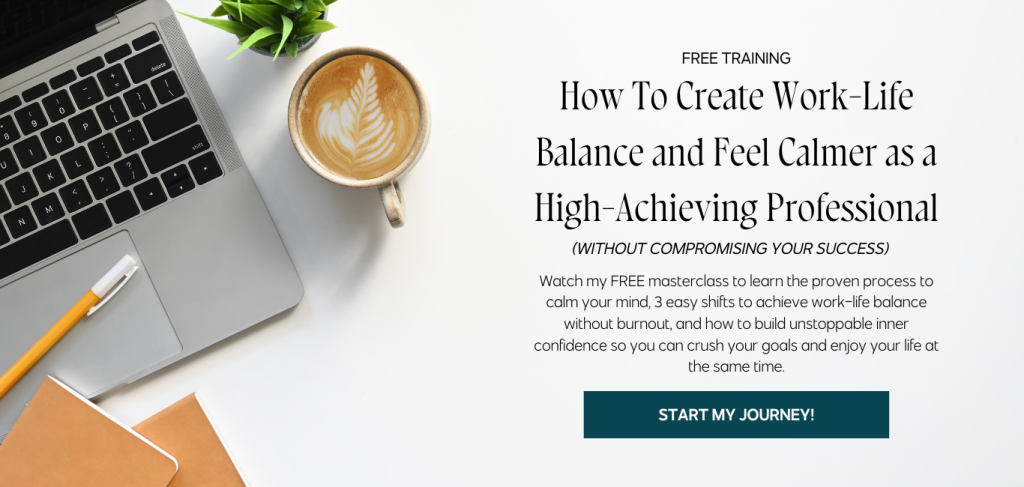
LISTEN, REVIEW, AND SUBSCRIBE TO THE PODCAST!
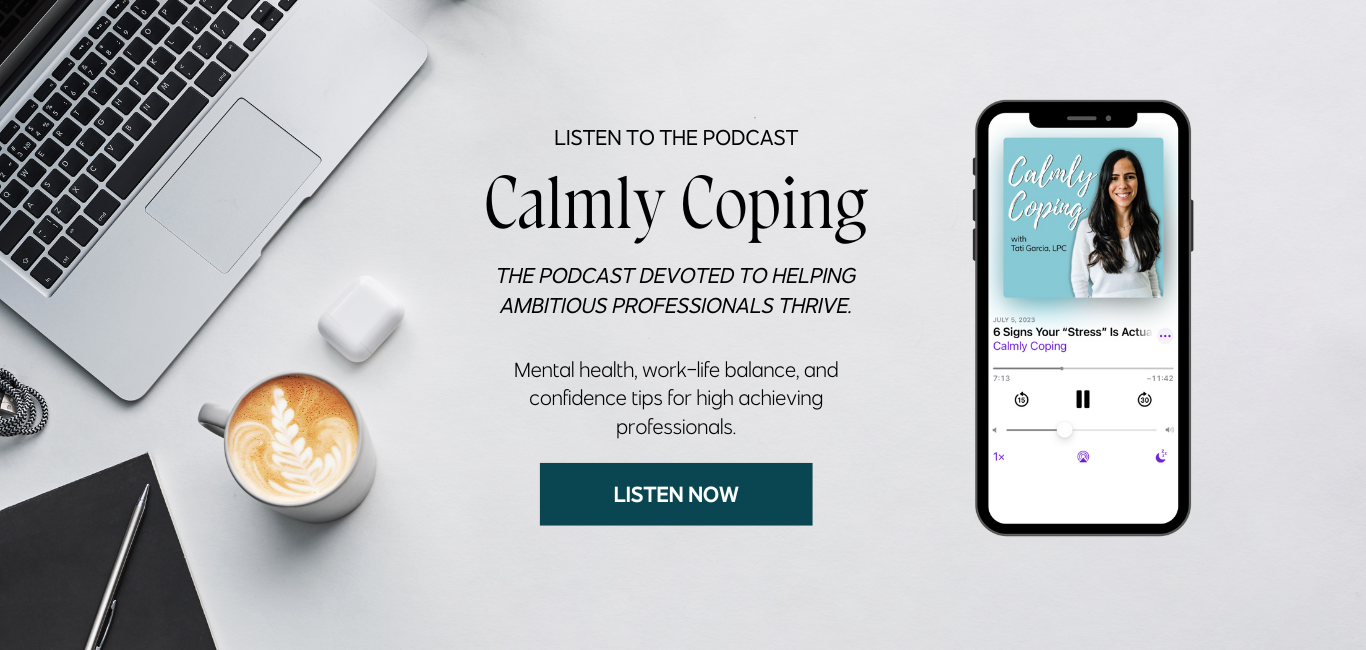
INTRO/OUTRO MUSIC: Rescue Me (Instrumental) by Aussens@iter (c) copyright 2018 Licensed under a Creative Commons Attribution (3.0) license. http://dig.ccmixter.org/files/tobias_weber/57990 Ft: Copperhead
DISCLAIMER: All content here is for informational purposes only. This content does not replace the professional judgment of your own mental health provider. Please consult a licensed mental health professional for all individual questions and issues.
Interested in diving deeper to get support for high-functioning anxiety?
I offer 1:1 coaching to help high-achievers overcoming high-functioning anxiety so they can feel calmer, more present, and have improved balance in their lives. Click here if you’re interested in learning more and getting started.
Calm, Balanced, & Confident is my comprehensive A→Z self-paced course to help high-achieving professionals overcome high-functioning anxiety so they can feel calmer, balanced, and more confident without the anxiety and overwhelm. Click here to learn more and enroll today.
Looking for ongoing support and guidance with high-functioning anxiety? The Calm & Ambitious Community is the exclusive community for high achievers with high-functioning anxiety. Click here to learn more and join us today!
TRANSCRIPT:
Click to view the episode transcript.
Do you put too much pressure on yourself? Everybody needs to put pressure on themselves at one time or another to get things done to motivate themselves and to be successful But how much pressure is too much pressure? And if it is how do you get yourself out of this cycle and this trap of putting too much pressure on yourself?
That’s what we’re going to talk all about in today’s episode So stay tuned if this is something that you’re interested in learning more about. So how much of the pressure that you put on yourself is healthy, and how much of it just results in more stress, tension, and anxiety? It can be especially easy to put pressure on yourself when you struggle with high functioning anxiety.
That’s because you might tend to be a perfectionist and have really high expectations for yourself, and that might come from the fear of failure, or judgment, or making mistakes. The reason why putting a lot of pressure on yourself and having these expectations can be really uncomfortable is because your anxiety makes you so afraid of the outcome.
So it makes you so afraid of, you know, what if I don’t do well? Or what if this isn’t good enough? And, you know, this happens for me sometimes. It’s happening right now when I’m recording this podcast episode. I’m putting pressure on myself to make this a good episode, and so then part of me feels afraid.
Well, what if this episode sucks? What if it doesn’t come out the way I want it to what if people don’t understand what I’m trying to say and so all of those what ifs and those fears can make it so that you are starting to feel uncomfortable. You’re starting to feel anxious and then it makes it harder to actually do well.
So in reality, the pressure that you’re putting on yourself a lot of times, especially when it’s resulting in that anxiety, that discomfort and that fear and tension, it actually makes you perform worse. And that’s because when you’re putting pressure on yourself, your emotions are heightened. And especially if you’re feeling anxious, your body might be in fight or flight.
And so your body and your mind are just looking out for safety. And when your body is in that state, it’s really hard to think properly. It’s hard to feel relaxed and calm and it’s hard to do your best. So in reality, we think that pressure and putting a lot of pressure on ourselves is going to motivate us, but it actually makes it harder to do work, to be authentic and to feel confident because there are these
unrealistic expectations in addition to the emotional arousal that occurs and that combination just makes it so that you might start to freeze. You might start to procrastinate because you’re feeling uncomfortable and doubtful. You might start to overthink or overanalyze things. And all of these things are a consequence of that pressure that you’re putting on yourself and those expectations that you have for yourself.
So we’re going to talk all about this in today’s episode and what you can do about it. So how do you know when you’re putting too much pressure on yourself? And how do you cope with that and change that pattern? So first let’s talk about what pressure is. So pressure can result when you get an idea in your head or you have a belief such as I need to be successful.
I need to accomplish. These certain things by a certain age. Maybe it’s I need to get married. I need to have children. Whatever those beliefs are, they’re only thoughts and expectations, but they can often feel so real and so necessary because of the pressure that you experience from yourself. And a lot of times this can stem from social pressure and expectations.
So maybe it’s the beliefs of your parents. your partner or what you see all of your friends doing. As humans, we’re so easily influenced by people around us, especially those that we care about because this is a part of surviving. You know, as humans, we’re social creatures and evolutionarily we survived by being in groups and tribes.
And so it’s really important to feel accepted and to feel a part of the group because that was a very important part of survival and still is as a human being. You know, the thing is that the people that care about you and the people that you see have expectations that may have good intentions for you.
They probably want you to be happy and live a fulfilling life. But when does that expectation become a life that you’re living for somebody else and for these ideas of what you think your life should be like, or when you will be happy, and not for yourself? The thing is that these expectations and the pressure that you put on yourself can feel so real and so important.
And that’s because a lot of times it is. And we often have these ideas of goals or accomplishments that we need to meet in our lives in order to feel happy, and in order to feel like we’ve made it. But a lot of times, This pressure can really just run amok, especially if you’re not checking in with what you truly want and what you truly value.
So, for example, let’s say you have this idea that if you work a lot or you move your way up in your company, then you’re going to be happy, but then in the process of doing that, You’re feeling burnt out, you’re feeling overworked, you’re stressed out, and you never have time for yourself and for your family and for those other things that matter to you in life.
It gets to the point where you’re so focused on this goal and idea of success, in the process, maybe losing yourself and losing your enjoyment in life. So, this can be when pressure becomes too much. When you lose sight of the experience and the enjoyment of the present moment for some abstract future goal.
It’s when you feel a lot of tension, stress, and anxiety a lot of the time. And it’s when you feel uncomfortable and fearful if you’re not putting this pressure on yourself. So you feel like the only way you can be successful is if you’re putting all this pressure on yourself and being hard on yourself.
That can often mean that you’re putting too much pressure on yourself. And the thing is that it’s a really a double edged sword because you fear that if you don’t put pressure on yourself, then you’re not going to be successful or you’re not going to accomplish your goals. Then at the same time, putting that pressure on yourself makes it harder to feel happy and successful in your life.
So pressure can really come from two sources. So there’s the external pressure that I spoke about, which might be from sources other than yourself. So that could be media, society, family, friends, social media, or the news. And then there’s internal pressure. So these are the expectations that you create yourself.
The thing is that this internal pressure is what you’re responsible for and this is what influences your mood and the things that you do. External pressure can really contribute to and influence the internal pressure that you put on yourself. But at the end of the day, the internal pressure is the stuff that makes you suffer and the stuff that makes you feel stressed and anxious because it’s that vicious cycle that you are creating yourself as a result of your thoughts, your beliefs, and the things that you feel like you have to do.
So how do you deal with this pressure? One important thing is to take time to reflect. You can’t address the pressure in your life without first identifying it. So one way that can help is to take some time to reflect or journal about what types of pressure you’re putting on yourself. So maybe it’s pressure to have a successful job, eat healthier, to get married, to have more money, to live your life in a certain way, or to be perfect all the time and never make mistakes.
I want you to really think about what your expectations are for your life and how you may be putting undue pressure on yourself to meet these expectations. Now, once you’ve identified the types of pressure that you put on yourself, then you can start to reflect on where these beliefs come from. So identifying where those beliefs come from can really help you to understand what contributed to this pressure that you’re putting on yourself.
Do your parents have the expectation that you need to have a specific career or job in order to be happy? Or maybe you see all of your friends getting married and you feel the pressure to do so yourself. As silly as these thoughts may sound, they’re all too realistic when it comes to the social pressure and expectations that can influence how you view yourself and your life.
And ultimately, you’re the one who’s responsible for the choices that you make and the pressure that you put on yourself in your life. So another place that pressure might come from are what are called self fulfilling prophecies. Wikipedia defines these as quote a prediction that directly or indirectly causes itself to become true by the very terms of the prophecy itself due to positive feedback between belief and behavior unquote.
So an example of this might be that let’s say you got good grades as a child. And your parents and teachers reinforced the belief that you were smart. And the children in class who didn’t do well may have had the belief reinforced that they weren’t smart. And the teacher and parents might have treated these students accordingly.
So as a result, the students come to think of them as the adults think of them. So for example, if your parents always told you you’re so smart or your teachers reinforced this growing up, Then you’re going to see being smart as a big part of your personality and vice versa. If you were told that you weren’t smart or say you’re not weren’t good in math or you didn’t do well in this, then these beliefs can become deeply ingrained and you might view yourself as either smart or not, depending on the reinforcement of these beliefs.
So it can help to think if you’ve experienced any of this reinforcement in your life. Have you ever performed well or not well and were labeled as such, and then you kept this label that kept you trapped in this belief and this expectation of yourself? So some examples of labels or self fulfilling prophecies might be whether you’re smart or intelligent.
Maybe one might be that you don’t do well in school if you perform poorly. If you were seen as a troublemaker or a criminal, if you were seen as a high achiever, or if you were seen as lazy. So all of these are just labels of static behavior and expectations that people have put upon you and then you’ve put upon yourself.
So the problem with these labels is that they are not you. The only constant in life is change. And to put these static expectations on yourself is unrealistic and can actually keep you trapped. Now, before we move on, if you want to learn more about my step by step process to say goodbye to overwhelm, Then make sure you click on the links in the show notes or go to calmly coping.
com / overwhelm. I have a free guide that’s going to help you dive deeper on how to get all of those thoughts and overwhelming what ifs out of your head. And this guide will walk you step by step through the process to completely organize your tasks and thoughts so you can prioritize what’s most important and take intentional focused action.
So make sure you click on the link in the show notes or go to calmly coping. com / overwhelm. So how do you get out of this pressure trap? It all starts with becoming aware. So, I’m going to break down the practice of identifying and acknowledging the pressure traps that you’ve created for yourself.
So step one is to identify the pressure and expectations that you’ve put on yourself. So this is what I discussed previously when I talked about journaling and reflecting on this pressure. So what are the expectations that you have for your life and these big goals and aspirations? And then number two is to identify the source of these pressures.
So does this pressure come from external sources or labels that other people have put upon you? Or does this pressure come from internal sources or labels that you have reinforced in yourself? So the thing to remember is that at the end of the day, you are responsible for the pressure you put on yourself and for the actions that you do as a result.
And then step number three is to journal and reflect upon how are these pressures and expectations limiting you? How are they causing you to stress yourself out and burn yourself out? Reflection is such a helpful tool for really noticing and challenging the unconscious patterns that we constantly live our lives repeating.
Oftentimes it can be easy to be afraid of change and facing these patterns so that you continually avoid looking at them. I’m guilty of this myself and when I can find the time to reflect on my beliefs and expectations for myself, it’s so immensely helpful. Because it’s easy to get stuck in that blind cycle of not really understanding where your motivations are coming from until you bring them to the light and really recognize what’s going on.
So it’s important to remember that your beliefs, your expectations, and pressures are only thoughts. They’re not facts, and they’re not reality. Oftentimes, we are our own toughest critics. And we cause so much undue suffering just because of how we think we quote unquote should be living our lives. So take some time to check yourself and check your beliefs, and you might be surprised at how much you live your life on autopilot just believing all of these thoughts to be facts.
It can be a tough journey, but I know that you’re more than capable if you’re willing to put in the work. So let me know if you have any tips for dealing with the pressure and expectations that you put on yourself by sending me a DM on Instagram at Tatiana GLPC. So your action step just to wrap up is to start to reflect and become aware as to how you put pressure and expectations on yourself.
So step one is to identify the pressure and expectations that you’ve put on yourself. Step two is to identify the source of these pressures, how much of it is external and how much is internal. And step three is to reflect on how are these pressures or expectations limiting you and how are they causing you to stress yourself out and burn yourself out.
All right, so that’s it for today’s episode. I hope that these tips were helpful for you, and if you found this episode helpful, please feel free to screenshot yourself listening to it and share it to your Instagram stories, tagging me @TatianaGLPC, and please share it with a friend if you found this episode helpful.
Thank you so much for tuning in. Until next time, be calm.
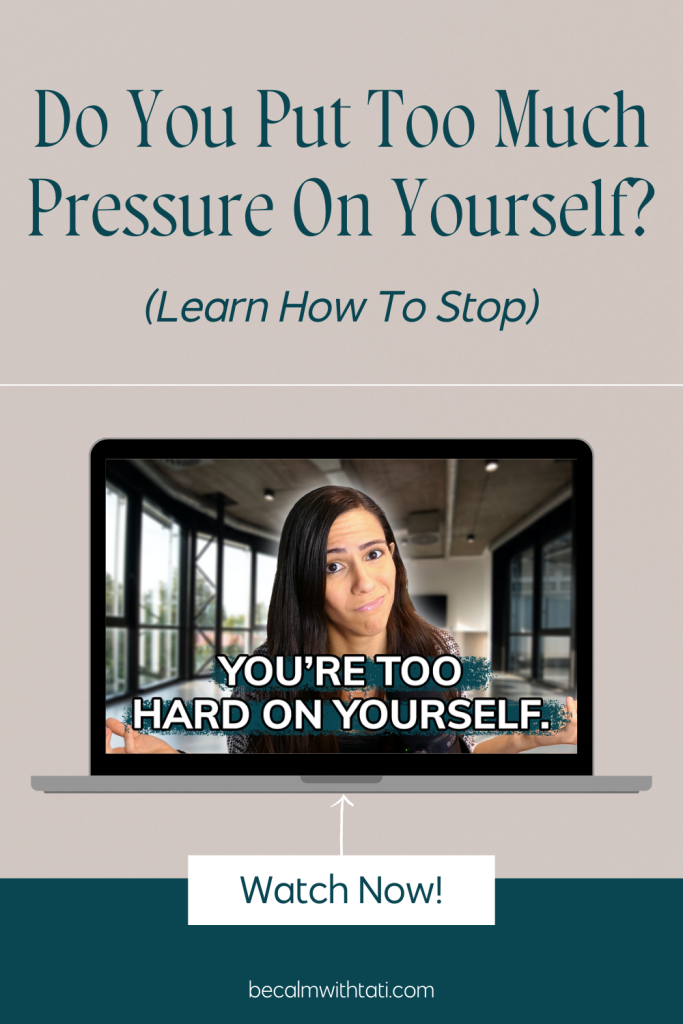

Until next time…




